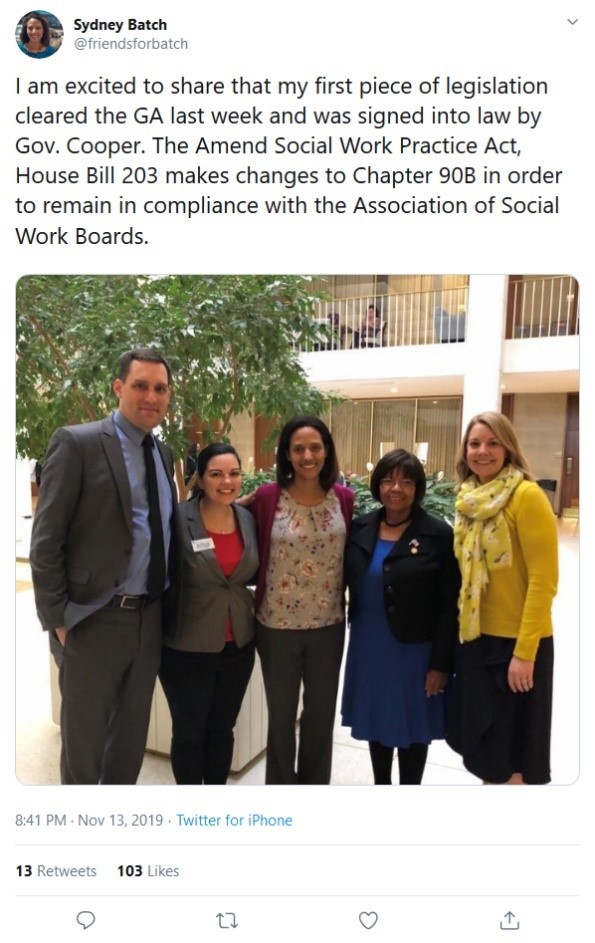North Carolina amendment brings state into compliance with exam use policy
Member exchange
For the North Carolina Social Work Certification and Licensure Board, a process that began three and a half years ago—when ASWB let its members know that they would have until June 2021 to come into compliance with its exam use policy—ended in November. Governor Roy Cooper signed SB 537, legislation that amends the state’s social work practice act to require clinical social workers to take the Clinical examination after two years of supervised practice, rather than within two years of being issued North Carolina’s Licensed Clinical Social Worker Associate license.
Typically, this license is issued to social workers with an MSW who are in the process of acquiring experience and supervision hours toward earning their Clinical license. The law goes into effect January 2021.
According to ASWB Policy 2.1, “The Clinical exam has been developed for use as a licensure requirement by member boards that issue to individuals who have an MSW and two years (or commensurate experience as defined by the jurisdiction) of experience in clinical settings, licenses for the practice of Clinical Social Work.” Allowing licensure candidates to take the exam before that time can erode the exam’s reliability, and consequently its validity. Part of the process of ensuring validity includes maintaining high psychometric standards by gathering statistics on item (test question) performance. If the data collected is to be an accurate measurement of an exam’s performance, it’s critical that only test-takers with the intended education and experience take an exam.

As soon as ASWB set the exam compliance deadline, the North Carolina board began to review its practice act. “The board established an ad hoc committee to review the statute and the ASWB model law before proposing language to the entire board,” said Elizabeth Pope, the board’s executive director.
During the next two years, stakeholder meetings were held, and the NASW-North Carolina chapter became involved to advocate for the amendment with the North Carolina General Assembly.
During this process, ASWB provided the North Carolina board and stakeholders with background information about exam requirements in other jurisdictions as the jurisdiction considered ways to enhance practice mobility. Cara Sanner, ASWB regulatory support services coordinator, provided needed data, and Dwight Hymans, ASWB chief operating officer, attended a stakeholder meeting in 2018 to talk about ASWB exam validity and answer questions about the exam use policy.
By early 2019, “I was spending several days a week in Raleigh,” Pope said. She had only just become the board’s executive director in January. “I learned a lot about how an idea becomes a law. It was enlightening; I was surprised at how political the process was.”
Representatives Sydney Batch, Graig Meyer, and MaryAnn Black of the North Carolina General Assembly signed on as three of the bill’s primary sponsors. All three have degrees in social work. The board’s legal counsel was also involved throughout the process. The lawyer’s guidance and expertise proved critical, Pope said, especially because the bill’s path was not straight. The original bill did not pass through its committee hearing, “which resulted in the board regrouping and strategizing new avenues for getting the bill to pass,” Pope said. In April 2019, the bill was joined with bills concerning substance abuse counselors and licensed professional counselors. The combined bill passed the rules committee in May. It passed in the House with no opposition in August, passed in the Senate in October, and was signed in November.
An additional provision of the new law is to limit to six years the time allowed for an individual licensed as an Associate to pass the Clinical exam and acquire clinical practice experience. Once the licensee has held the LCSWA for six years without passing the exam, the individual forfeits all supervision and experience hours accrued and must pass the Masters exam before beginning again to accumulate hours needed for the LCSW, the license required to practice clinical social work independently.
“The big picture was the public protection that is provided by having an exam in place. That was a motivator.” Elizabeth Pope, Executive Director North Carolina Social Work Certification and Licensure Board
“This was a long, drawn-out journey,” said Pope, “requiring the cooperation of many people with different agendas.” She advises other boards involved in similar pursuits to be prepared to be flexible. “While we didn’t land exactly where we would have liked to, I feel we did an excellent job at meeting the needs of all parties involved.” Despite the need for flexibility and the complex process required to get the new law in place, Pope feels that public protection remained at the forefront as the board sought to come into compliance with the exam use policy. “The big picture was the public protection that is provided by having an exam in place,” she said. “That was a motivator.”
Hymans, who serves as the ASWB point of contact for the review process, says that of the 23 jurisdictions that were out of compliance when the 2021 deadline was announced, only nine remain in that status. Most of the nine jurisdictions are working with ASWB to make the needed changes that will bring them into compliance with the exam use policy by the deadline. Some boards have made or will work to make changes to laws and regulations like North Carolina’s board did. Others are best served by requesting an exception to ASWB’s exam use policy. Hymans reminds member boards that ASWB is available to assist them: “We are always willing to talk to your board members and board staff to answer questions or concerns about compliance with exam policy.”

